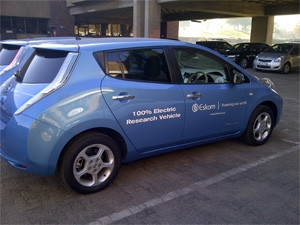
South African motorists can save up to R18 000 a year on petrol costs, provided they are willing to pay more than R450 000 to purchase an electric vehicle (EV).
According to a study by the uYilo e-Mobility Technology Innovation Programme at the Nelson Mandela Metropolitan University (NMMU), running an all-electric car like the Nissan Leaf for a year costs R18 000 less than a petrol-consuming car.
The Nissan Leaf is South Africa's first fully electric vehicle, with 80 units having been sold since the car became commercially available in 2013.
"The results show the real value in purchasing an EV, especially considering the current cost of fuel," says Hitten Parmar, acting director of the uYilo Programme.
The savings, as well as the low maintenance costs of EVs, make them a smart choice for consumers in the car market, Parmar adds.
Money talks
The research study supported by government, Eskom and car-makers was compiled to fast-track the development of electric vehicles in South Africa. A fleet of Nissan Leaf EVs were provided to support the study.
Although the research shows some savings for the consumer, motorists will have to pay a hefty sum to purchase a Nissan Leaf EV.
In 2013, the Nissan Leaf went on sale at a retail price of R446 000. Including electricity costs of about R22 500 over a six-year period and maintenance costs of R1 500, the total cost of the car over the six-year period is R470 000, explains Mike Whitfield, MD of Nissan South Africa.
According to Whitfield, Nissan was proud to support and partner with uYilo and NMMU to develop EV infrastructure and technology in South Africa.
"We firmly believe EVs will play an important role in transportation and South Africa is in prime position to lead this innovation on the continent," says Whitfield.
Energy supply
Despite the advantages of driving EVs in South Africa, there are questions about the country's struggles with sufficient power supply.
However, it has been noted the next step for uYilo's research is to investigate how the cars can be integrated into the grid management system.
"Nissan's long-term vision puts electric vehicle batteries at the heart of the power grid, storing electricity during times of low demand, and releasing it back during peak hours," says Whitfield.
Nissan is working on solidifying an EV charging infrastructure in the country and has set out to increase capacity in the next 12 months. "There will be 30 charging stations in Gauteng, 12 in KwaZulu-Natal, 10 in Port Elizabeth, 15 in Cape Town, 10 in Mpumalanga, 10 in Limpopo and five in central South Africa," it says.
Market ambitions
South African-based company Big Boss has announced plans to unveil an electric car in the new year.
According to Big Boss, the manufacturing of the electric car, also dubbed "Big Boss", will initially be in China and the company envisages bringing production to SA after selling the first 1 000 units.
Unlike the Nissan Leaf, the Big Boss is planned to retail for between R250 000 and R300 000, and it will come in different ranges covering different distances per charge. Recharging the battery will not exceed R20, depending on the power of the battery, says company founder Rishiden Samraj.
Meanwhile, ITWeb has learned Johannesburg suburb, Parkhurst, is in the process of installing solar-powered electric car charging points in the area.
Earlier this year, the Parkhurst Residents and Business Owners' Association (PRBOA) launched the 'Go-Green' project to stimulate renewable energy use. As part of the initiative and working with the City of Joburg, the PRBOA planned to install a number of solar-powered EV charging stations.
According to the PRBOA, the charging stations would be installed in areas specifically demarcated for electric vehicles.
Share